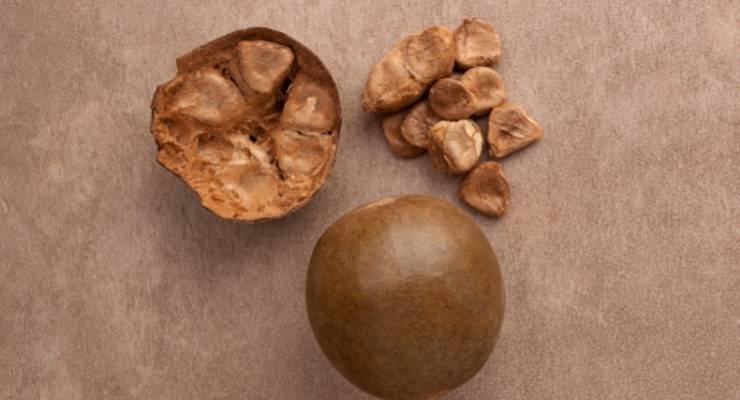08.09.22
A new sweetener derived from a fruit called luo han guo (commonly known as Monk Fruit) was able to increase beneficial human gut microbes in lab settings, marking the extract as having a prebiotic potential, pending future human clinical studies. The research was published in the Journal of Agricultural and Food Chemistry.
According to the researchers, while certain naturally sweet substances such as galacto-oligosaccharides are low calorie sugars with prebiotic activity, they’re not quite sweet enough to be used as sugar alternatives. However, extracts from the luo han guo fruit contain mogrosides, which are several-hundred times sweeter than sugar. The extracts need to be treated with enzymes in order to reduce a number of off-flavors.
In order to take advantage of this aspect, the researchers used enzymes to modify mogrosides while simultaneously producing galacto-oligosaccharides in order to create a new low-calorie sweetener with potential prebiotic benefits.
The researchers started with lactose and mogroside V (the primary mogroside in luo han guo fruit). When they added β-galactosidase enzymes, the researchers obtained a mixture that contained mostly galacto-oligosaccharides and a small amount of modified mogrosides. A trained sensory panel reported that the new combination had a sweetness similar to that of sucrose, suggesting it could be acceptable to consumers.
In test tube experiments, the new sweetener increased the levels of multiple human gut microbes that are beneficial, including Bifidobacterium and Lactobacillus bacterial species. In addition, increases in bacteria-produced metabolites, such as acetate, propionate and butyrate, indicated that the mixture could potentially have a prebiotic effect on the gut microbiome.
The researchers wrote that the new sweetener holds promise in these initial analyses, and their next step is to more closely study the substance’s impact on human gut health.
According to the researchers, while certain naturally sweet substances such as galacto-oligosaccharides are low calorie sugars with prebiotic activity, they’re not quite sweet enough to be used as sugar alternatives. However, extracts from the luo han guo fruit contain mogrosides, which are several-hundred times sweeter than sugar. The extracts need to be treated with enzymes in order to reduce a number of off-flavors.
In order to take advantage of this aspect, the researchers used enzymes to modify mogrosides while simultaneously producing galacto-oligosaccharides in order to create a new low-calorie sweetener with potential prebiotic benefits.
The researchers started with lactose and mogroside V (the primary mogroside in luo han guo fruit). When they added β-galactosidase enzymes, the researchers obtained a mixture that contained mostly galacto-oligosaccharides and a small amount of modified mogrosides. A trained sensory panel reported that the new combination had a sweetness similar to that of sucrose, suggesting it could be acceptable to consumers.
In test tube experiments, the new sweetener increased the levels of multiple human gut microbes that are beneficial, including Bifidobacterium and Lactobacillus bacterial species. In addition, increases in bacteria-produced metabolites, such as acetate, propionate and butyrate, indicated that the mixture could potentially have a prebiotic effect on the gut microbiome.
The researchers wrote that the new sweetener holds promise in these initial analyses, and their next step is to more closely study the substance’s impact on human gut health.




























